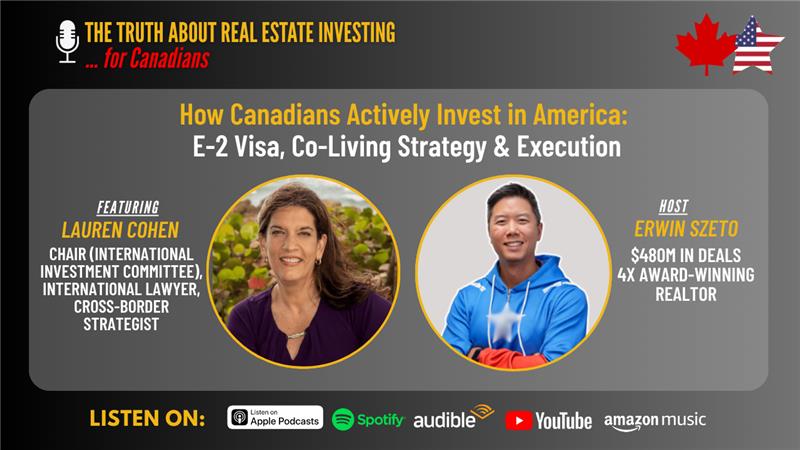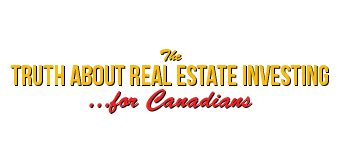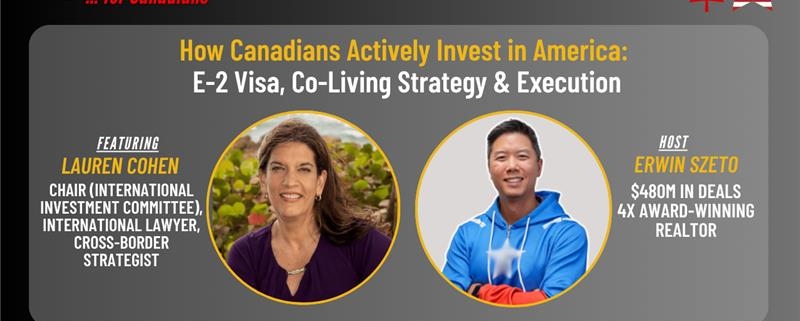How Canadians Actively Invest in America: E-2 Visa, Co-Living Strategy & Execution

Recorded: October 2025
Guest:️ Lauren Cohen, International lawyer and cross-border strategist
Host: Erwin Szeto, The Truth About Real Estate Investing for Canadians Podcast
Canadian investors are no longer waiting for Ottawa’s next move — they’re moving capital and opportunity south. In this episode, international lawyer and cross-border strategist Lauren Cohen explains how Canadians can actively invest in the U.S. using the E-2 visa and smart business models like co-living real estate.
The “Coveted” Visa:
The E-2 visa allows Canadians to live in the U.S. while owning and operating a real business — typically granted in five-year renewable terms. It’s flexible, family-friendly (the spouse can work anywhere), and perfect for entrepreneurs who want to turn investments into lifestyle freedom.
Active, Not Passive:
Purely passive rentals don’t qualify for E-2 purposes. Lauren’s team builds operating businesses around real estate assets, ensuring they meet visa requirements and produce sustainable income. Most investors start with US$100–150K in capital to establish a credible, scalable structure.
The Co-Living Edge:
Think of co-living as co-working for housing — multiple tenants renting by the room with ensuite baths. In affordable, growth markets like Jacksonville, Houston, and Atlanta, these models can produce 14–16% cap rates with professional management and affordable entry points around US$300–350K.
Timing Is Everything:
Visa policy shifts can happen overnight. Canadians considering a move should structure their entities and business plans early, before new fees or restrictions appear.
Next Steps:
If you’re ready to combine immigration strategy, business execution, and cash-flow real estate, visit InvestingAcrossBorders.net to learn more or book a strategy session with Lauren Cohen.
🎧 Listen to the full episode here
10 Rapid Fire Q&A
- What is an E-2 visa for Canadians?
A renewable five-year visa that lets Canadians live in the U.S. while owning and operating a substantial business.
- Can passive real estate qualify for E-2?
No — you must actively run a real, revenue-generating enterprise such as a co-living operation or service-based company.
- How much investment do Canadians need for E-2?
Typically US$100K–150K, though higher investments demonstrate stronger credibility and sustainability.
- What is co-living real estate?
A model where investors rent rooms by the door — like co-working for housing — yielding higher cash flow and flexibility.
- Best U.S. markets for co-living in 2025?
Jacksonville, Houston, and Atlanta — affordable entry, job growth, and strong rental demand.
- How much capital do I need to start?
Expect ~US$150K all-in, including 30% down and setup costs.
- Why are Canadians shifting investments to the U.S.?
Better cash flow, more business-friendly policies, and visa-linked opportunities for lifestyle flexibility.
- How quickly can U.S. visa rules change?
Changes can occur within 24 hours via presidential proclamations — proactive setup is essential.
- Can my spouse work in the U.S. on an E-2 visa?
Yes, the E-2 spouse can work anywhere in the United States.
- Where can Canadians learn about cross-border investing?
Visit InvestingAcrossBorders.net for resources, webinars, and personalized strategy sessions.
📜 Full Transcript
The full, cleaned transcript of my conversation with Lauren Cohen is available here for anyone who wants to dive deeper.
To Listen:
On Spotify: https://open.spotify.com/episode/6YnZZ4vwLiepqzYhpT5FS3?si=b17b2feef85943eb
Audible: https://www.audible.ca/pd/B0FYQFT7FY?source_code=ASSGB149080119000H&share_location=pdp
YouTube: https://youtu.be/qDUbfZH-Pog
🦸♂️Household Hero? Here’s Your Next Step
If you’re a Canadian investor trying to build wealth safely and sustainably, Adam’s journey has valuable takeaways.
It might be time to revisit your current strategies—real estate, lending, or insurance—and ask:
- Do your investments match your long-term goals?
- Do you fully understand how your strategies work?
- Would a more conservative approach offer better peace of mind?
Real estate remains a powerful tool for building wealth, especially with careful underwriting and due diligence. Insurance can be useful too—but only if it supports your broader financial goals.
Need help with conservative, peace-of-mind investing—backed by Wall Street-style due diligence—plus financial planning with your best interests at heart?
Until next time, happy Canadian and USA Real Estate Investing.
Erwin Szeto,
Your Cross Border Investment Guy
Why I’m Investing in the U.S.
I’ve been investing in Ontario since 2005. It’s been a great run—starting with properties in the $100Ks, now reaching $800K–$1M. How much higher can it go? I don’t know.
The remaining appreciation potential doesn’t justify the risk. That’s why I advise clients to look to the U.S., where rental properties range from $150K–$350K USD, with rents between $1,400–$2,600/month.
These cash-flowing numbers are night and day compared to Canada. Plus, landlords have rights, there’s no rent control, and income is in U.S. dollars—which are stronger than Canadian dollars.
If you don’t believe that U.S. dollars are stronger, ask 100 non-Canadians what they’d prefer to be paid in.
To regain control of your retirement, check out the cash-flow properties at:
👉 iwin.sharesfr.com
How SHARE Makes It Easier
The best part? My U.S. investments are more passive than my Canadian ones. I work with SHARE, an asset manager that guides me through the entire process.
SHARE helps with:
- Finding quality income properties
- Structuring the legal and tax side
- Managing the property manager and insurance provider
- Saving time and money with preferred rates
They even advise on when to refinance or sell. SHARE supports investors across the U.S., which is why I plan to own in Tennessee, Georgia, and Texas. It’s like having a JV partner—without giving up ownership or control.
Final Thoughts
If increasing cash flow is your goal, I don’t know of a better strategy for most Canadians. Once more: iwin.sharesfr.com is where to see what boring, cash-flowing investing looks like on the path to financial peace.
This is how I’m making real estate investing great again—for my family and hopefully for yours too.
Sponsored by… Me!
This episode isn’t sponsored—except by my wife Cherry and me. Real estate investing is our life. It’s helped us build wealth and achieve peace of mind about retirement and our children’s future.
Interested in our systematic approach to real estate investing—the same one used by most of my podcast guests? Then check out:
📍 infinitywealth.ca/events
Till next time—just do it. I believe in you.
Erwin Szeto
W: erwinszeto.com
FB: facebook.com/erwin.szeto
IG: @erwinszeto
Disclaimer
As a committed advocate for transparent and responsible investing, I want to disclose that I am an Advisor to SHARE SFR (Single Family Rental). I hold equity in the company and earn referral commissions from clients I refer.
My endorsement of their model—focusing on positive cash flow and direct ownership—is based on personal experience and belief. Still, every investor should do their own due diligence.




Leave a Reply
Want to join the discussion?Feel free to contribute!